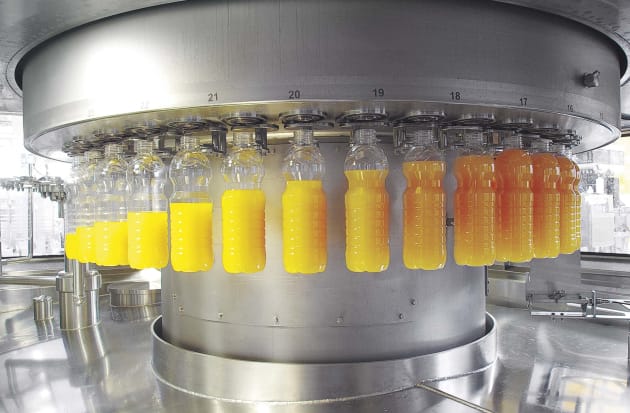PET equipment provider Sidel is helping meet demand for safe, healthy beverages through its range of aseptic applications.
There's a growing need for beverage producers to offer packaging solutions that are innovative and which meet food safety standards.
As a PET solutions company, Sidel works with liquid dairy products (LDP) and juices, nectars, soft drinks, isotonics and teas (JNSDIT) producers by providing PET aseptic complete line solutions.
According to Sidel, the consumption rates of JNSDIT and LDP products are now growing respectively by six per cent and five per cent on a yearly basis.
As this happens, the use of PET in these market segments continues to increase, with an annual growth of three per cent expected for the JNSDIT sector and eight per cent for LDP by 2020.
Sidel says producers can enlarge their bottling capacity or diversify their production with more value-added products in PET to maximise this market potential.
PET bottles reportedly offer strong physical protection and food barrier benefits that maintain the product’s safety and integrity across the supply chain.
Consumers are also becoming increasingly health-conscious and moving towards drinks with a more natural taste.
This has brought a focus from producers on filling methods that protect the quality, taste and vitamin content of the beverages.
Hot fill and aseptic filling solutions maintain the properties of beverages, according to Sidel.
Using PET in aseptic packaging solutions offers business opportunities through bottling sensitive products to be distributed at ambient temperature, preserving organoleptic properties, and keeping them free from bacteria.
It gives products a shelf life without pasteurisation, hot filling or the use of preservatives or sterilising agents.
Sidel's fully integrated solutions employ the processing equipment and capabilities of Tetra Pak Processing Systems (TPPS), the original inventor of aseptic technology.
Over the years, Sidel and TPPS have collaborated to define and execute almost 100 complete lines projects.
A sensitive science
Sensitive drinks can be affected by various factors when they are packaged – micro-organisms, light, oxygen and temperature.
If Sidel’s scientific expertise on beverage packaging and industrial production is involved early in a packaging project, producers will be able to optimise bottle performance while ensuring product safety and quality.
They will also achieve faster time to market and bottle designs which stand out on supermarket shelves, according to Sidel.
Tests are carried out under supply chain conditions to determine the optimal solution for defined distribution methods and shelf life.
Based on the results, Sidel experts then make recommendations on bottle barrier material, weight, shape and type of cap, in order to ensure the product’s desired shelf life.
Every year, Sidel works on more than 250,000 new bottle concepts and 8,000 bottle designs.
Patented protection
Sidel's PET aseptic filling solution with dry preform decontamination ensures product integrity, production flexibility, cost efficiency and sustainability.
As it is simpler to decontaminate the preform rather than the blown bottle, Sidel patented technology called 'Sidel Predis', which uses hydrogen peroxide mist to sterilise the preforms.
Injected into the preforms just before they enter the oven, the peroxide mist is activated during the existing preform heating stage.
The same technology is used for cap decontamination with Sidel’s 'Capdis'.
By integrating preform decontamination, blowing and filling functions with cap decontamination in a single enclosure, the Sidel aseptic Combi Predis ensures a completely sterile filled and capped PET bottle with a 100 per cent dry aseptic solution.
A line with few critical factors is managed more easily and effectively.
This is achieved by minimising the sterile zone to reduce risk of contamination, continuously monitoring critical parameters and controlling potential contamination.
This process ensures a high level of decontamination up to a Sterility Assurance Level (SAL) of Log 6, without need for blow moulder sterilisation.
This aseptic Combi Predis uses membrane-free magnetic filling for safe, hygienic filling with flow meter control for high accuracy.
The end result is reliable, simple aseptic beverage production in PET bottles, ideal for products distributed at ambient temperature.
It can also help lengthen shelf life and reformulate more sensitive beverages that would otherwise need added preservatives to maintain food safety.
Suitable for aseptic production ranging from 10,000 to 60,000 bottles per hour, it can handle a broad variety of drinks (still beverages or products with pulps), including those with high or low acidity such as UHT milk and soy or yak milk.
Better end-user engagement
For the sensitive drinks producer, the challenge lies in ensuring product safety and quality across the supply chain.
It is also important for a beverage or dairy brand to stand out on the supermarket shelf to influence consumer purchasing decisions.
The label and the pack help significantly in attracting consumers’ attention and encouraging them to select one product over another.
Sidel’s complete aseptic lines are able to take advantage of a wide range of versatile, reliable labelling and packing solutions to help beverage producers to attract and differentiate, while ensuring sustainable production.

Whether roll-fed or sleeve labels are required for aseptic beverages, Sidel labellers can handle any label format with fast, consistent roll-fed labelling or efficient, high-quality, heat-shrink sleeve labelling.
Whether shrink-printed film, nested packs or wrap-around cartons are required, it is important to keep this layer appealing, strong and functional.
Sidel flexible secondary packing systems offer reliable pack consistency and durable quality, while the company’s palletising solutions and compact robotic solutions, with high production speeds and multiple patterns, handle a variety of products, packs and layers with easy operation and greater line versatility.







